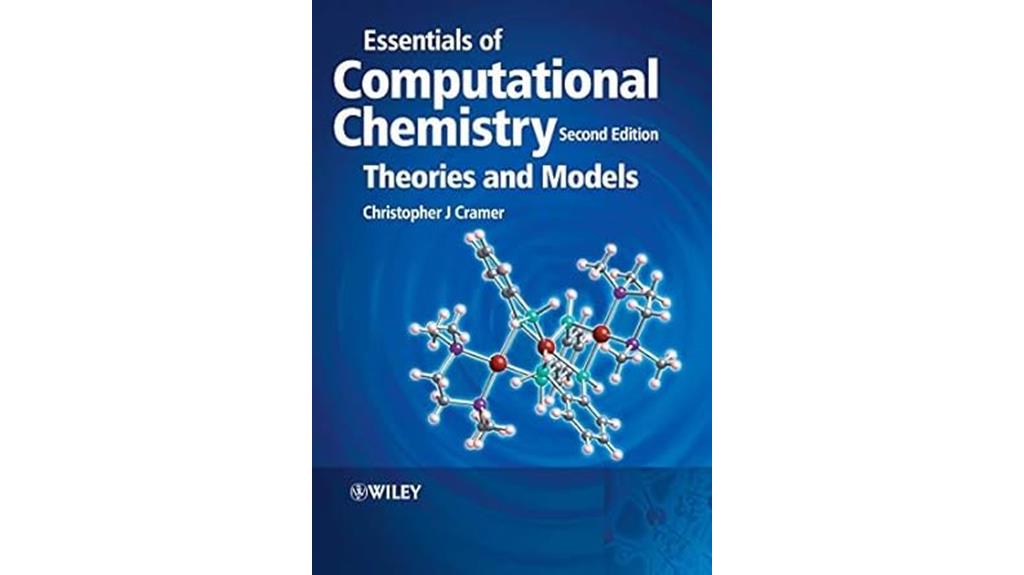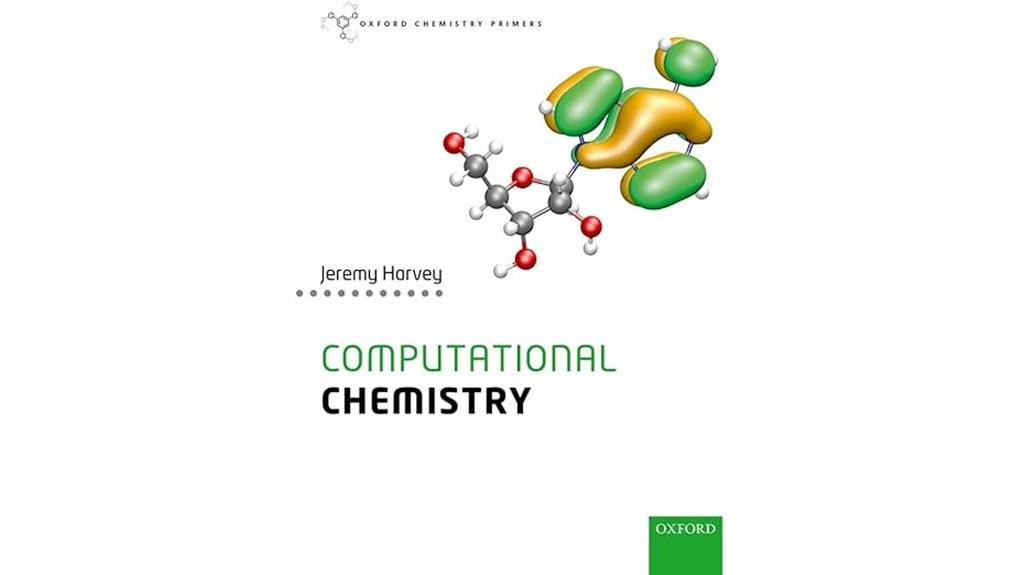For researchers and scientists, the top computational chemistry tools are: Essentials Of Computational Chemistry for broad theories, Introduction to Computational Chemistry for modern methods intuition, and Computational Chemistry (Oxford Chemistry Primers) for depth in quantum mechanics. Consider alignment with calculations, method compatibility, user interface, tutorials, and value for cost and licensing when selecting.
Key Takeaways
- Consider compatibility with required methods and software.
- Evaluate user interface and interoperability with other programs.
- Look for detailed tutorials, documentation, and user support.
- Assess cost and licensing options.
- Ensure alignment with research needs and objectives.
Essentials Of Computational Chemistry: Theories And Models

For researchers and scientists seeking a thorough yet accessible guide in computational chemistry, the book 'Computational Chemistry Tools' offers essential theories and models presented in a conversational tone suitable for all levels of expertise.
This book has garnered positive reviews for its ability to deliver intricate information in a digestible manner, making it a valuable resource for both beginners and experts in the field. It focuses on providing a detailed overview of general theories rather than delving into specific algorithms, which has been particularly appreciated by undergraduate and graduate students.
Additionally, the book covers important sections of computational chemistry, explains fundamentals clearly, and includes numerous practical application examples for better understanding and implementation.
Overall, student recommendations highlight its effectiveness in facilitating learning and research in computational chemistry.
Best For: Those looking for a comprehensive yet approachable guide to computational chemistry suitable for both beginners and experts.
Pros:
- Offers detailed theories and models in an easy-to-understand manner.
- Suitable for individuals at all levels of expertise.
- Provides a broad overview of general theories rather than specific algorithms.
Cons:
- Lacks mathematical derivations.
- Some may find the overview complex.
- Not available in all languages.
Introduction to Computational Chemistry

Ideal for researchers and scientists looking to gain quick insights into modern quantum chemistry approaches, the book 'Computational Chemistry Tools' offers clear explanations and a broad overview of computational methods. The positive reviews highlight the book's coverage of all modern computational chemistry methods and its ability to provide intuitive insights into quantum chemistry.
While the book is praised for its thorough scope and clear explanations, it's noted that prior knowledge of physical chemistry is recommended. Some challenging aspects include the lack of mathematical explanations in advanced topics and the swift move to complex subjects, which may pose difficulties for beginners.
Despite these challenges, the book receives favorable multilingual feedback, particularly for its elegant treatment of topics. Overall, it's recommended for those seeking a solid understanding of modern quantum chemistry approaches.
Best For: Researchers and scientists with prior knowledge of physical chemistry seeking clear insights into modern quantum chemistry approaches.
Pros:
- Covers all methods of modern computational chemistry with clear explanations.
- Good for picking up intuitions quickly on quantum chemistry.
- Offers a broad overview of computational methods in quantum chemistry.
Cons:
- Not recommended without prior knowledge of physical chemistry.
- Some advanced topics lack mathematical explanations.
- Swift move to complex subjects may be challenging for beginners.
Computational Chemistry (Oxford Chemistry Primers)

The book Computational Chemistry (Oxford Chemistry Primers) serves as a valuable resource for chemists aiming to explore the world of computational chemistry, offering a clear explanation of complex quantum mechanics concepts. Authored by Jeremy Harvey, this book is designed for those with an undergraduate-level understanding of quantum mechanics.
It covers essential topics like 6-31G and cc-pVQZ, providing a solid foundation for further exploration. The included exercises are instrumental in enhancing practical knowledge and comprehension.
Harvey's writing style has been praised for its clarity and informative nature, making this book an ideal choice for readers interested in quantum and computational chemistry. Overall, this text is highly recommended as an exhaustive introduction to the field of computational chemistry.
Best For: Chemists seeking a clear and informative introduction to computational chemistry with an undergraduate-level understanding of quantum mechanics.
Pros:
- Clear explanation of complex quantum mechanics concepts
- In-depth coverage of essential topics like 6-31G and cc-pVQZ
- Practical exercises included for building experience and understanding
Cons:
- May not be suitable for complete beginners without any background in quantum mechanics
- Focuses more on theory than practical applications
- Limited coverage of advanced computational chemistry topics
Factors to Consider When Choosing Computational Chemistry
When choosing computational chemistry tools, it's important to consider key selection factors. Evaluating criteria breakdown is crucial to make a well-informed decision. Listing important considerations ensures choosing the right tool for research and scientific needs.
It's essential to have decision-making essentials in mind to guarantee the selection process is thorough and aligns with specific research requirements.
Key Selection Factors
Considering the level of expertise required is important when selecting computational chemistry tools for research and scientific purposes. Whether you're a beginner looking for introductory materials or an advanced researcher in need of specialized resources, matching the complexity of the tool with your skill level is essential.
Additionally, evaluating the scope of the material covered is significant to make sure it meets your specific research or learning needs in computational chemistry. Look for resources that offer clear explanations and examples to facilitate the understanding of intricate concepts. Practical applications and exercises included in the material can greatly enhance hands-on learning and skill development.
Furthermore, finding a balance between theoretical explanations and mathematical derivations is crucial based on your learning preferences and requirements in computational chemistry. By considering these key selection factors, you can optimize your choice of computational chemistry tools for effective research and scientific endeavors.
Evaluation Criteria Breakdown
To effectively choose computational chemistry tools, I break down the evaluation criteria into specific factors that directly impact the selection process. Firstly, it's important to take into account the level of mathematical rigor required for your research goals. Aligning resources with your current understanding of quantum mechanics and computational methods is essential for seamless integration into your work.
Additionally, evaluating the depth of coverage on key topics such as molecular dynamics, quantum chemical calculations, and statistical mechanics is essential to make sure the tool meets your research needs.
Practical examples and exercises play a significant role in enhancing learning and application, so checking for their presence is advisable. Lastly, a balance between theoretical explanations and practical implementation in computational chemistry is a critical factor to consider when choosing a tool.
Important Considerations List
When selecting computational chemistry tools, one must carefully assess various factors to guarantee compatibility with research goals and expertise levels. Firstly, it's important to consider the level of mathematical background required for the computational chemistry methods of interest. Understanding the math involved is essential for effectively utilizing these tools.
Additionally, evaluating the computational resources needed for the simulations planned is key. Making sure that the tools align with available resources prevents potential setbacks during research.
When choosing books on computational chemistry, look for ones that strike a balance between theoretical explanations and practical applications. Moreover, consider whether the book covers a broad range of topics or focuses on specific areas relevant to your research.
Decision-Making Essentials
As I assess computational chemistry tools, the decision-making process hinges on key factors that determine their suitability for my research endeavors.
Firstly, the level of prior knowledge in physical chemistry required to grasp complex computational chemistry topics is important. Understanding the depth of mathematical explanations provided in a resource is essential for effective learning.
Additionally, the clarity and well-referenced content in books play a significant role in comprehending quantum chemistry concepts.
Furthermore, evaluating the scope and coverage of topics is essential to guarantee a thorough understanding of modern computational chemistry approaches.
Lastly, considering the availability of exercises and practical examples is significant for building experience and enhancing understanding in computational chemistry.
These factors collectively contribute to selecting the most suitable computational chemistry tools that align with the specific research needs and learning objectives.
Choosing the Right Tool
Considering factors such as the type of calculations needed and the compatibility with required methods and software, choosing the right computational chemistry tool is vital for successful research outcomes.
It's important to align the tool with the level of theory and methods necessary for your specific research objectives.
Additionally, evaluating the user interface and compatibility with other essential programs can streamline your workflow and enhance productivity.
Look for tools that offer detailed tutorials, documentation, and reliable user support to assist in both learning the tool and troubleshooting any issues that may arise during your research.
Moreover, evaluating the cost and licensing options of the tool is paramount to ensure it fits within your budget constraints.
Frequently Asked Questions
Can These Computational Tools Predict Experimental Results Accurately?
I believe these computational tools can predict experimental results accurately. They leverage advanced algorithms and models to simulate chemical processes effectively. However, validation with experimental data and ongoing refinement are essential for enhancing their predictive capabilities.
Are There Computational Chemistry Tools Specifically for Drug Discovery?
Absolutely, there are mind-blowing computational chemistry tools tailored for drug discovery! They revolutionize the process by efficiently screening vast chemical databases, predicting drug-target interactions, and accelerating the development of new medications.
How Can Computational Chemistry Aid in Materials Science Research?
Computational chemistry can aid in materials science research by predicting properties, simulating reactions, and understanding molecular structures. These tools enable me to design new materials, optimize processes, and explore novel applications.
Are There Computational Tools Suitable for Studying Enzymatic Reactions?
In my research, computational tools like Gaussian, Q-Chem, and CHARMM have proven suitable for studying enzymatic reactions. They offer precise simulations that aid in understanding reaction mechanisms and enzyme kinetics, enhancing our insights.
Can Computational Chemistry Software Handle Large-Scale Calculations Efficiently?
Yes, computational chemistry software can efficiently handle large-scale calculations. I've found that these tools streamline complex calculations, making them manageable even on a grand scale, which is essential for my research.
Conclusion
To sum up, computational chemistry tools provide invaluable support for researchers and scientists in the field. While some may argue that these tools are complex and difficult to use, the benefits far outweigh any initial challenges.
By utilizing tools like Gaussian, ORCA, and NWChem, researchers can enhance their understanding of chemical systems and accelerate their research progress.
So don't be intimidated by the complexity, explore and see the powerful impact these tools can have on your work.
Practical Aspects Of Computational Chemistry Iii
Author by : Jerzy Leszczynski
Languange Used : en
Release Date : 2014-04-23
Publisher by : Springer Science & Business
ISBN :
Description : Theoretical and Computational Chemistry research has made unparalleled advancements in understanding every expanding area of science and technology. This volume presents the state-of-the-art research and progress made by eminent researchers in the area of theoretical computational chemistry and physics. The title mirrors the name of the annual international conference “Conference on Current Trends on Computational Chemistry” (CCTCC) which has become a popular discussion ground for eminent Theoretical and Computational Chemists and has been honored by the presence of several Nobel Laureates. Practical Aspects of Computational Chemistry III is aimed at theoretical and computational chemists, physical chemists, material scientists and those who are eager to apply computational chemistry methods to problems of chemical and physical importance. The book is a valuable resource for undergraduate, graduate and PhD students as well as established researchers....
Mathematical Challenges From Theoretical Computational Chemistry
Author by : Committee on Mathematical Challenges from Computational Chemistry
Languange Used : en
Release Date : 1995-04-12
Publisher by : National Academies Press
ISBN :
Description : Computational methods are rapidly becoming major tools of theoretical, pharmaceutical, materials, and biological chemists. Accordingly, the mathematical models and numerical analysis that underlie these methods have an increasingly important and direct role to play in the progress of many areas of chemistry. This book explores the research interface between computational chemistry and the mathematical sciences. In language that is aimed at non-specialists, it documents some prominent examples of past successful cross-fertilizations between the fields and explores the mathematical research opportunities in a broad cross-section of chemical research frontiers. It also discusses cultural differences between the two fields and makes recommendations for overcoming those differences and generally promoting this interdisciplinary work....
Computational Chemistry Methodology In Structural Biology And Materials Sciences
Author by : Tanmoy Chakraborty
Languange Used : en
Release Date : 2017-10-03
Publisher by : CRC Press
ISBN :
Description : Computational Chemistry Methodology in Structural Biology and Materials Sciences provides a selection of new research in theoretical and experimental chemistry, focusing on topics in the materials science and biological activity. Part 1, on Computational Chemistry Methodology in Biological Activity, of the book emphasizes presents new developments in the domain of theoretical and computational chemistry and its applications to bioactive molecules. It looks at various aspects of density functional theory and other issues. Part 2, on Computational Chemistry Methodology in Materials Science, presents informative new research on computational chemistry as applied to materials science. The wide range of topics regarding the application of theoretical and experimental chemistry and materials science and biological domain will be valuable in the context of addressing contemporary research problems....
Theoretical And Computational Chemistry
Author by : Iwona Gulaczyk
Languange Used : en
Release Date : 2021-06-08
Publisher by : Walter de Gruyter GmbH & Co KG
ISBN :
Description : This book explores the applications of computational chemistry ranging from the pharmaceutical industry and molecular structure determination to spectroscopy and astrophysics. The authors detail how calculations can be used to solve a wide range of practical challenges encountered in research and industry....
Computational Chemistry
Author by : David Young
Languange Used : en
Release Date : 2004-04-07
Publisher by : John Wiley & Sons
ISBN :
Description : A practical, easily accessible guide for bench-top chemists, thisbook focuses on accurately applying computational chemistrytechniques to everyday chemistry problems. Provides nonmathematical explanations of advanced topics incomputational chemistry. Focuses on when and how to apply different computationaltechniques. Addresses computational chemistry connections to biochemicalsystems and polymers. Provides a prioritized list of methods for attacking difficultcomputational chemistry problems, and compares advantages anddisadvantages of various approximation techniques. Describes how the choice of methods of software affectsrequirements for computer memory and processing time....
Reviews In Computational Chemistry Volume 10
Author by : Kenny B. Lipkowitz
Languange Used : en
Release Date : 2009-09-22
Publisher by : John Wiley & Sons
ISBN :
Description : Not only a major reference work for sale to the library market, Reviews in Computational Chemistry is now a purchase by individuals due to the explosive growth in the use of computational chemistry throughout many scientific disciplines. In an instructional and nonmathematical style, these books provide an access to computational methods often outside a researcher's area of expertise. Volumes 9 & 10 represent the next two volumes in the successful series designed to help the chemistry community keep current with the many new developments in computational techniques. Many chapters are written as tutorials to introduce the many facets of computational chemistry, including molecular modeling, computer-assisted molecular design (CAMD), quantum chemistry, molecular mechanics and dynamics, and quantitative structure-activity relationships (QSAR). The authors provide necessary background and theory, strategies for implementing the methods, pitfalls to avoid, applications, and references....
Computational Tools For Chemical Biology
Author by : Sonsoles Martín-Santamaría
Languange Used : en
Release Date : 2017-11-01
Publisher by : Royal Society of Chemistry
ISBN :
Description : This book offers a fresh perspective on how computational tools can aid the chemical biology research community and drive new research....